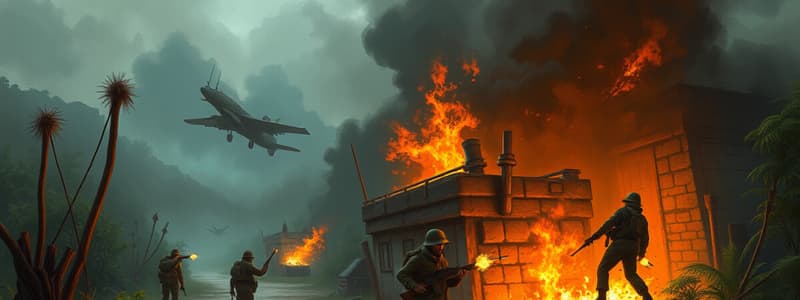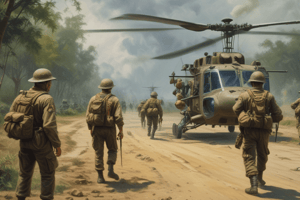Podcast
Questions and Answers
What was a main cause of the Vietnam War?
What was a main cause of the Vietnam War?
- Ho Chi Minh's push for communism (correct)
- The Soviet Union's involvement
- U.S. support for the French (correct)
- Civil rights movements in the U.S.
How did the Vietnam War end?
How did the Vietnam War end?
The Vietnam War ended with the Paris Peace Accords.
How did the Vietnam War affect Americans?
How did the Vietnam War affect Americans?
Many Americans opposed the war, and returning soldiers faced hostility.
What is the meaning of the domino theory?
What is the meaning of the domino theory?
What is a guerilla?
What is a guerilla?
What is napalm?
What is napalm?
What is agent orange?
What is agent orange?
What does credibility gap refer to?
What does credibility gap refer to?
What is a tech-in?
What is a tech-in?
What does 'dove' refer to in the context of the Vietnam War?
What does 'dove' refer to in the context of the Vietnam War?
What does 'hawk' refer to in the context of the Vietnam War?
What does 'hawk' refer to in the context of the Vietnam War?
What is linkage?
What is linkage?
What does vietnamization mean?
What does vietnamization mean?
Who was Ho Chi Minh?
Who was Ho Chi Minh?
Where did the final battle that forced the French out of Vietnam take place?
Where did the final battle that forced the French out of Vietnam take place?
What were the Geneva Accords?
What were the Geneva Accords?
Who was Ngo Dinh Diem?
Who was Ngo Dinh Diem?
What were the Viet Cong?
What were the Viet Cong?
What is the Gulf of Tonkin Resolution?
What is the Gulf of Tonkin Resolution?
What is the Ho Chi Minh Trail?
What is the Ho Chi Minh Trail?
Who was William Westmoreland?
Who was William Westmoreland?
What was the Tet Offensive?
What was the Tet Offensive?
Who was Henry Kissinger?
Who was Henry Kissinger?
Flashcards are hidden until you start studying
Study Notes
Causes of the Vietnam War
- Ho Chi Minh advocated for communism in Vietnam, resisting French colonial control.
- The U.S. intervened due to concerns about the spread of communism after China and North Korea fell to communist regimes.
End of the Vietnam War
- The Vietnam War concluded with the Paris Peace Accords, where the U.S. agreed to withdraw troops in exchange for the release of American prisoners of war.
American Perception and Effects
- Many Americans opposed the Vietnam War, viewing it as a foreign conflict that didn't involve them.
- Returning soldiers faced hostility, reflecting public dissent towards the war.
Domino Theory
- A political hypothesis suggesting if one nation adopts communism, neighboring nations will likely follow.
Guerrilla Warfare
- Involves irregular combatants employing sabotage and harassment against a more powerful adversary.
Use of Napalm
- A highly flammable substance used by U.S. forces in incendiary attacks during the war.
Agent Orange
- A herbicide used to destroy foliage, aimed at exposing the Viet Cong.
Credibility Gap
- The disconnect between public support and the Johnson Administration's communications regarding the war.
Tech-in
- Informal discussions at colleges focusing on the Vietnam War and reasons for opposition.
Dove vs. Hawk
- "Doves" are individuals opposed to the Vietnam War, while "Hawks" support U.S. involvement in the conflict.
Linkage Policy
- A strategy aimed at improving relations with the Soviet Union and China to reduce their support for North Vietnam.
Vietnamization
- Nixon's strategy to gradually withdraw U.S. troops, replacing them with South Vietnamese forces.
Ho Chi Minh
- A prominent communist leader in Vietnam, active in the fight against South Vietnam until his death in 1969.
Dien Bien Phu
- The battle site that led to the French departure from Vietnam.
Geneva Accords
- A diplomatic agreement in 1954 that bifurcated Vietnam into a communist North and non-communist South, pending elections.
Ngo Dinh Diem
- South Vietnam's American-backed leader (1954-1963), whose repressive governance encouraged the growth of the Viet Cong.
Viet Cong
- Guerrilla fighters for the communist side in Vietnam, known as the National Liberation Front.
Gulf of Tonkin Resolution
- Passed in August 1964, this allowed President Johnson to use military force in Southeast Asia without a formal war declaration from Congress.
Ho Chi Minh Trail
- A supply route from North Vietnam through Laos and Cambodia to South Vietnam, critical for military operations by North Vietnam.
William Westmoreland
- General who led U.S. military efforts at the peak of the Vietnam War from 1964-1968.
Tet Offensive
- A significant 1968 attack by North Vietnamese forces during the Vietnamese New Year, leading to high casualties and altering American public opinion.
Henry Kissinger
- Secretary of State instrumental in U.S. foreign policy during the Nixon era, key figure in the Paris Peace Accords, and Nobel Peace Prize recipient.
Studying That Suits You
Use AI to generate personalized quizzes and flashcards to suit your learning preferences.




